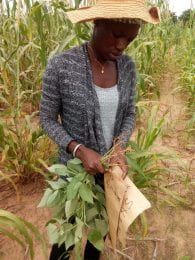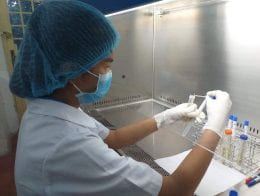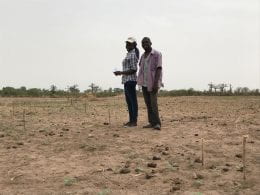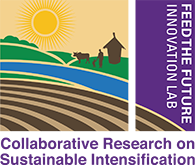Fatou Tine is in her last year of her PhD program at the University of Dakar in Senegal, conducting research for her dissertation funded through support from the Feed the Future Innovation Lab for Collaborative Research on Sustainable Intensification (SIIL) at Kansas State University (KSU).
After graduating with a master’s degree from Virginia Tech in May 2016, she decided to return to her home country, Senegal, and contribute to its agricultural development by sharing her knowledge with farmers and young students who are currently training to be tomorrow’s leaders. As excited as she was to return and contribute to the modernization and expansion of her country’s expansive agricultural sector, she, at first, could not find any opportunities open for her to do so, as there were no positions available at the time. Therefore, she spent her first two months in Senegal at home and, from time to time, visiting and assisting friends from university and other research institutions. Fortunately, at the end of her second month back home, she received the opportunity to participate in data collection for a survey on cashew farmers in the Kolda area.

While conducting this data collection for the National Center of Forestry Research, she met an acquaintance who spoke to her about SIIL and its important role in assisting with sustainable agriculture research in Senegal. With this funding, aimed at building capacity in SIIL target countries in East and West Africa, as well as Southeast Asia, researchers and students alike, and youth and women in particular, have the opportunity to be trained in their field, as well as conduct research on their chosen topic. After meeting with the in-country SIIL team, she was selected as a PhD student in Agronomy, and received funding to do both her studies and her research.
As Fatou observes, “A woman running an agriculture project is not an easy thing to do in Senegal, however, with the support from the wonderful SIIL team, I was able to conduct my field experiments, collect data, and also enjoy time with my family.”
During these last three years, SIIL has not only provided funding for her research, but has also provided several opportunities for personal and professional development through trainings, meetings and other relevant activities. Additionally, working with SIIL has allowed her to improve her knowledge and skills in agriculture, particularly within the Senegalese agricultural system, as well as internationally.
As a result of her time working with SIIL and its partners, most recently she had the opportunity to connect with Peace Corps Senegal, leading to her securing a position with them as an Agriculture Program and Training Specialist. This is especially exciting, as SIIL maintains a close partnership with the in-country Peace Corps program, providing training to new and continuing agriculture Peace Corps volunteers. “I am excited to use my skills professionally and am very grateful for the opportunities that SIIL has provided for me though their support”, says Fatou.








